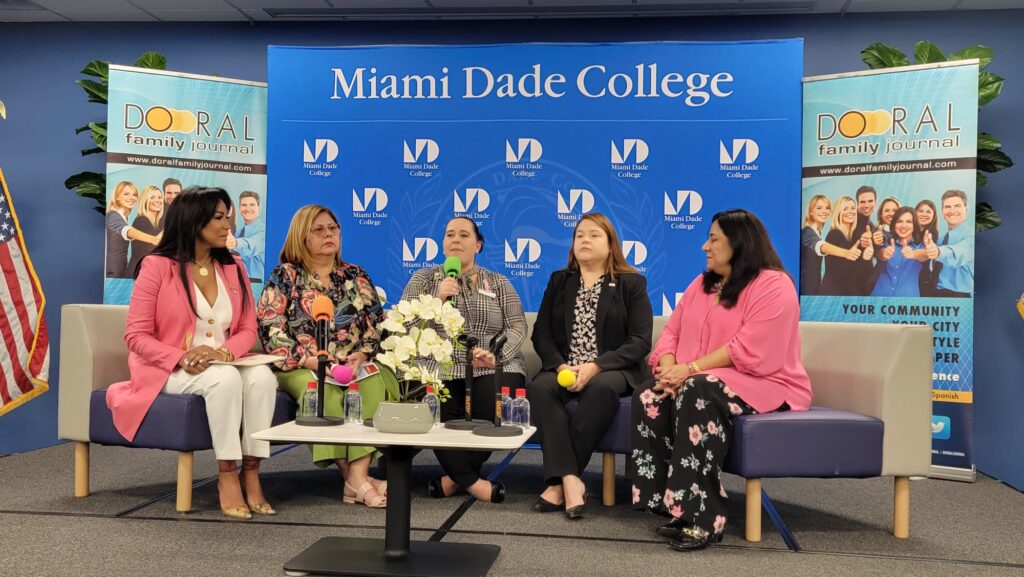Doral Family Journal hosts breast cancer awareness forum
DORAL, FL – Doral Family Journal hosted with success ‘Beyond the pink: Breast Cancer Awareness and Prevention Forum’ at Miami Dade College West Campus.
The event, that took place Thursday, Oct. 17, was an opportunity to sit experts of different fields and backgrounds around the topic of breast cancer and everything it implies for families, patients and caregivers.
Moderated by Dr. Trinidad Argüelles, associate professor of psychology at Miami Dade College, the forum included interventions of Georgette Valls-Delgado, associate director of Cancer Center Partnerships at American Cancer Society, Joan Gonzalez, executive director of American Cancer Society Southeast Florida, Mireya Goni, consultant at Washington National Insurance, and Ysdaly Thielen, senior medical and cosmetic tattoo artist and owner at BG Integrative.
“I’m here not only representing Miami Dade College West Campus, but also as the daughter of someone who battled with cancer for 17 years,” said Dr. Argüelles, who became a caregiver at the young age of 13.
She thinks there is still much to do to continue fighting against this disease so that someday hopefully its eradicated.
But for that to happen, it’s essential that hospitals, patients and families receive enough support. “That requires mainly education, prevention, diagnosis and treatment” Georgette Valls-Delgado says.
“Patients are now living way longer than before and there are many survivors,” she says, while explaining her job consists of providing support to hospitals in order for them to have the resources they need to help patients and their communities during the cancer path.
In this path, the work of volunteers is vital, as Joan Gonzalez explained. “We wouldn’t be able to do what we do without volunteers, and even though we would like for cancer to end, in the meantime, we need funding to aid patients and caregivers so that ultimately nobody else hears the words ‘you have cancer’.”
And speaking of funding, Mireya Goni spoke of the many advantages of purchasing the right type of insurance plan. “Prevention against cancer in a society like this one implies financial protection, because a disease like this one arrives without notice, opens the door of your house, sits in your living room, asks for food, shelter and money and steals away everything from you.”
One way to avoid that fate, according to Goni, is having access to a health insurance plan that covers more reducing out-of-pocket money from families. “My company guarantees that in every stage of the disease, you will have cash to deal with medical expenses, which is an invaluable help to battle against the disease.”
Another resource that sometimes breast cancer victims don’t know about is the possibility of having their nipples rebuilt and their scars reduced after a removal surgery through a 3D areola and nipple tattoo and skin and scar camouflage. This is precisely what Ysdaly Thielen does at her business.
“I know what a scar can make you feel or the fact that you don’t have a nipple. That’s why it’s very important for everyone to learn this exists, not only for esthetic purposes, but also for what it provides emotionally.”
Education, support and volunteering, pillars to fight against breast cancer
As suggested before, it’s not possible to fight against breast cancer without education. “Education is a two-way street,” says Georgette. “Hospitals and organizations like the one I work at must educate the community, but we all need to educate ourselves. We provide guidelines on when to undergo a screening to detect cancer, but that is only a suggestion. At the end of the day, it’s very important to know your body and visit your doctor if you feel something is not okay or normal.”
But if you are going to get educated, use the right sources, Georgette says. For her, the only two trust-worthy sources are the American Cancer Society and the National Cancer Institute. They provide not only the correct information, but also in a way that is easy to understand for everyone.
About volunteering, there are many ways to give back, Joan says. According to her, the power of volunteers lies in the fact they help spread knowledge on prevention and research.
“There are different types of volunteers. Some people donate money, while others donate part of their time to complete tasks such as opening doors for corporate partnerships, advocate to help change laws, make the government invest in research and that insurances cover more screenings and tests.”
Others help with transportation to patients and peer support. “People can donate as little as four hours a month.”
And why is getting educated and informed important? According to Mireya Goni, because resources are limited. “Patients stop working and the family loses a source of income. Luckily, there are insurance plans for middle class workers, you just need to know where they are and knock doors.”
The burden can be so heavy that families not only need to tackle the right health insurance plan but find support through groups or one-to-one meetings. “There are many resources and groups for kids, teens and young adults and a lot of hospitals have support groups opened to the public,” Georgette says.

